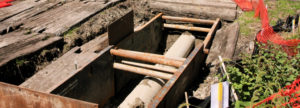ARPA-E REPAIR Program: Retrofitting Pipelines to Rehabilitate the Natural Gas Infrastructure
 To continue to bring natural gas safely and efficiently to market, it is vital to maintain and modernize critical delivery infrastructure. The Advanced Research Projects Agency-Energy (ARPA-E) Rapid Encapsulation of Pipelines Avoiding Intensive Replacement (REPAIR) program is focused on enhancing the performance and longevity of natural gas distribution systems by addressing leaks from legacy and outdated natural gas pipes and working to reduce costs per mile by 10–20x. A suite of technologies to enable the automated construction of new robust pipes inside of existing pipes is being created, offering retrofits to rehabilitate the existing system.
To continue to bring natural gas safely and efficiently to market, it is vital to maintain and modernize critical delivery infrastructure. The Advanced Research Projects Agency-Energy (ARPA-E) Rapid Encapsulation of Pipelines Avoiding Intensive Replacement (REPAIR) program is focused on enhancing the performance and longevity of natural gas distribution systems by addressing leaks from legacy and outdated natural gas pipes and working to reduce costs per mile by 10–20x. A suite of technologies to enable the automated construction of new robust pipes inside of existing pipes is being created, offering retrofits to rehabilitate the existing system.
GTI Energy is playing an important role in the $5.4 million evaluation and testing portion of the program being led by the University of Colorado at Boulder. Collaborating with other partners Cornell University and the University of Southern Queensland, the team will test and analyze pipeline encapsulation technologies that can meet utility and regulatory requirements.
The multi-institutional team will develop a comprehensive data-driven framework of physical testing and modeling to enable the gas industry to better evaluate and validate products it uses to rehabilitate aging cast iron and steel natural gas pipelines.
The objective is to validate a 50-year design life for innovative pipe-in-pipe (PIP) systems by developing numerical, analytical, and physical testing protocols. The effort will focus on pinpointing when pipes are likely to fail, characterizing failure modes, and establishing performance criteria for pipe replacements to support recommendations for suitable PIP material properties.
In addition, Operations Technology Development (OTD) is managing the Testing and Technical Specifications Panel (TTSP) for the program. OTD has assembled a team of industry professionals that will provide critical expertise to validate the technologies for industry use and acceptance. Participants from utility companies, state and federal regulatory bodies, research organizations, standards organizations, gas industry organizations, and other groups will provide input and guidance to ARPA-E and performers to help overcome both operational and regulatory hurdles to enable broad industry adoption.
Learn More
Contact the energy experts today
